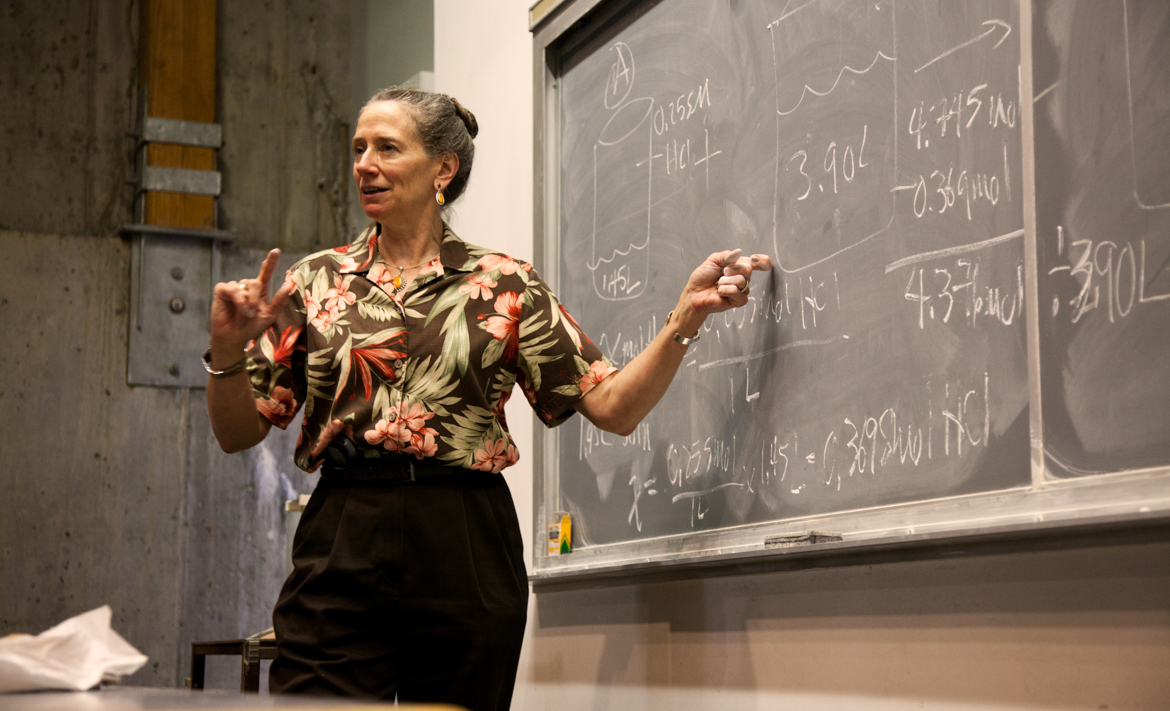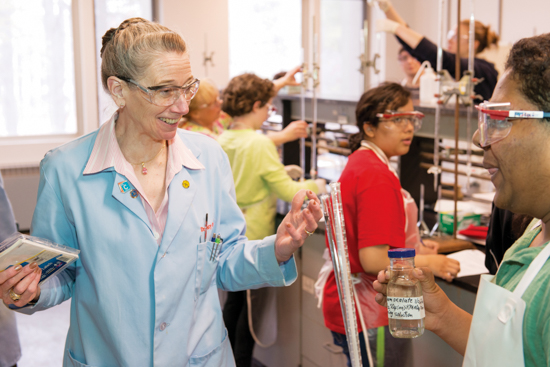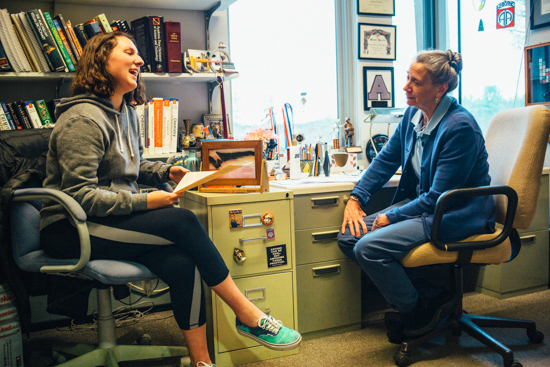- Home
- Academics
- Faculty Bios
- Science, Mathematics, and Computing Faculty
- An Exceptional Identity
An Exceptional Identity
Professor of Chemistry Patty Dooley reflects on Simon’s Rock and the campus community.

I am a professor of chemistry at Bard College at Simon’s Rock, the nation’s only residential early college. What does that mean? It means that Simon’s Rock is the only fulltime, fully accredited, academically rigorous (and highly rated) residential college of the liberal arts and sciences that exclusively admits students ready to forego 11th and 12th grade and immediately begin college. Our students are, on average, 16.5 years old when they begin their freshman year. Most of our associate of arts degree earners are teenagers and some of our bachelor’s degree earners are still teenagers. One young man from Orange County, NY, now in his first year of medical school, turned 18 one week after earning his bachelor’s degree in 2014. That’s the early part.
The residential part is also crucial. Our campus fosters a genuine sense of community, and because our program is designed exclusively for teenagers leaving school after 10th or 11th grade, our students immediately feel at home here. Other colleges permit high school students to enroll in college classes in lieu of high school courses, but these students are still high school students. Some colleges accept the same early college cohort we seek into their student population, but the young 15, 16, and 17 year-old students are a significant minority among more traditional 18-22 year-olds. Imagine the potential for friction between and among such different ages and stages of maturity!
What is it like to teach these eager young minds? I view them as intellectual sponges. I see them walk in the door as bone-dry sponges, curious about everything, undecided about what to focus on because they want to study and learn everything, and they are not afraid to share that curiosity with other students. I taught chemistry for 12 years at the United States Military Academy, which has indisputably high-quality applicants, and the more somber—more likely, continuously fatigued—approach by West Point cadets to academics made the rare occasion of the light bulb coming on over their heads a very special event for me. At Simon’s Rock, the light bulb is always on over students’ heads, and frequently I get to see it burn a little brighter as a result of my interaction with a student whose interest or curiosity I piqued. I hear “That’s cool!” far more frequently in Fisher Science and Academic Center at Simon’s Rock than I ever did at Bartlett Hall on West Point, and I attribute that to the fearlessness of an eager young mind indifferent to the perception of peers or of being considered a geek. At Simon’s Rock, being called a geek is a term of endearment.
“As exciting as it is to engage these courageous and curious young minds, the best part of my job is that I am ‘Patty’ to my students.”
Teaching at Simon’s Rock is not all lollipops and roses. Students have difficulty adjusting to having to study for the first time in their lives; the shock of seeing the first-ever grade of C on a seminar paper makes some of them think their lives are over. Time management? What’s that? Most students never had to prioritize out-of-class time in order to complete reading assignments, problem sets, lab reports, homework, essays, or presentations, and so learning how to deal with competing requirements and distractions such as Facebook and computer games makes them grow up very quickly. A robust support system of peer tutors, psychological counselors, residence directors, and academic advisors provides a safety net that catches them before they fall through the cracks. Frequent social events, athletic competitions with local private boarding schools, and student-created clubs fill a void in the social life of a college student too young to drive or imbibe.
Prospective students visit our campus frequently, and I attempt to engage them with the promise of intellectually invigorating classes and their parents with the assurance of a collective close eye cast upon their Too-Young-To-Start-College!-teenager. I have a routine that student admission representatives roll their eyes at when I begin my spiel. I ask the prospies where home is, what grade they’re in, what they’re interested in studying, and then I tell them I wish I had known about Simon’s Rock when I was in 10th grade, because I knew then I was at the peak of my academic career. I point out the four sheepskin diplomas on my office wall, symbols of being better educated than they are right now, but not smarter than they are. If I had started at Simon’s Rock in 1972, 6 years into the existence of the college, instead of plodding through 11th and 12 grades at Hazelwood High School in St. Louis, I could’ve been somebody! But then I tell them that I don’t know if I would have had the fortitude it takes to do a “left face and walk off stage” away from the comforting cocoon of family, community, and school, and I congratulate them on having the personal courage to even consider doing this.
As exciting as it is to engage these courageous and curious young minds, the best part of my job is that I am “Patty” to my students. At Simon’s Rock, as a vehicle to drag our young students into a self-perception of adulthood, everyone addresses everyone else by first names. From provost to housekeeper, from dean to swim coach, we are all on a first-name basis. After 30 years as an Army officer, anyone who could interpret the insignia of rank on my collar and read my name tape knew my name. Captain Dooley, Colonel Dooley. I thought that upon retirement I would be called Doctor or Professor Dooley. But, no…. The Academic Dean who hired me asked if I would be able to adjust to this, knowing my military background. I thought for a millisecond, smiled, and said, “I have my identity back!”
Text originally published in The Society of Daughters of the United States Army 2016 Annual Report & Directory

